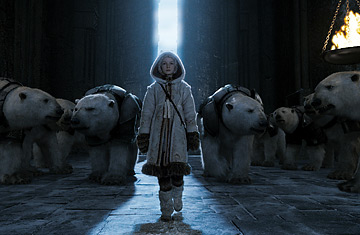
The Golden Compass
(2 of 2)
Kidman-Coulter is all purring perfidy as she slinks through the mansion where Lyra is her guest and captive. The lady wears her gold or white ensembles so perfectly, you can almost hear the frocks whisper thank-you as they cling to her. But the bloodshot eyes are the giveaway to the character's venality. Her daemon is another: it's an ill-tempered monkey, with whom she has an abusive parent relationship. In one of the film's sharpest, most surprising scenes, Mrs. C. slaps it in anger, then promptly caresses and coos to it. Mummy hits you, Mummy loves you. Since that the daemon is an essential part of her personality, the flare-up gives hints of schizophrenia, amounts to self-abuse.
Kidman has played the bitch goddess before, though never with such silky pleasure in being malevolent. If there's a casting revelation, it's the lead actress, who was just 12 when she was chosen for Lyra, her first professional role. Dakota Blue Richards: it sounds like the name of a second-tier rock star's kid. But she's an actual English girl (with an American mother), and a knockout. Her look is both wary and sleepy, as if she'd just been poked awake from a bad dream. There's an intelligent insolence about Richards, suggesting a pre-teen Tilda Swinton. The girl has the burden of carrying the first half of the movie virtually alone, and does so effortlessly — as if she knows she was born to be appreciated in gigantic closeup — but unself-consciously, without the preening assertiveness of so many child actors. Thanks to Richards, Lyra is the complex character she should be: both earthy and magical.
Weitz's only previous solo directorial feature-film credit was the 2002 About a Boy, where he proved he was a confident shepherd of child actors. But he's not up to helming a superproduction like this. (At one point he dropped out of directing the film for that very reason.) Faithful to the novels' narrative if not their philosophy, his movie bustles through the plot twists and lightning characterizations as if it were its own Cliff Notes, rarely taking the time to acquaint the audience with Lyra's allies and enemies. Even a genre film has to relax; it's in the quieter moments that epic fantasies find their richness.
Watching this rough sketch of a better movie, I thought of an ideal director for The Golden Compass: Terry Gilliam, the wildly imaginative Monty Python alumnus who's equally at home in fractured fairy tales (Jabberwocky, The Brothers Grimm) and the voluptuous visualizing of otherworldly dictatorships (Brazil). But Gilliam is a handful for studio heads; he has a high ratio of aborted projects. To hire him would have taken balls on New Line's part, and quite possibly an financial death wish.
Say this for Weitz: he got the movie made, even in its current gelded form. But there's something missing, beyond the iconoclastic theology, in this perfectly OK, blandly underwhelming superproduction. The movie lacks an elevating passion, a cohesive vision, a soul. It's as if The Golden Compass has misplaced its artistic compass. Somebody stole its daemon.
Will the sequels get made, by Weitz or someone more gifted? Strictly on profit-and-loss terms, I'd guess no. The Golden Compass is unlikely to reach the LOTR stratosphere, and a company doesn't keep making money-draining pictures just to complete a trilogy. Remember, too, it's in the second and third books that Pullman revs up the blasphemy. Those film adaptations would have to be either offensive or unrecognizable.
Instead, get your own vision of the saga by reading the book. That's where fantasy comes alive, in the collaboration of the author and his audience of one. Often, the best movies play on the reader's own mindscreen.
